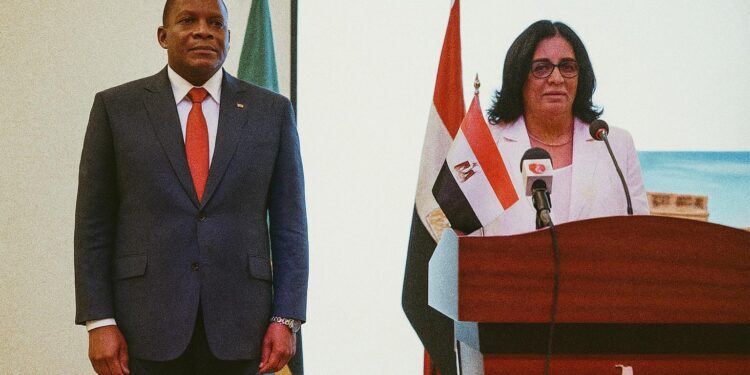From Bandung Spirit to Twenty-First-Century Pragmatism
Few African relationships have weathered post-independence turbulence with as much quiet resilience as that between the Republic of Congo and the Arab Republic of Egypt. Diplomatic archives recall that Cairo recognised Brazzaville within weeks of its 1960 independence, a gesture aligned with the pan-African solidarity fostered by President Gamal Abdel-Nasser (Institut d’Égypte pour les études diplomatiques 2022). Over six decades, that early camaraderie—rooted in the Bandung spirit of South-South cooperation—has evolved into a pragmatic framework that today serves both nations’ strategic calculations without ruffling regional sensitivities.
In July this year, Ambassador Imane Yakout used the occasion of Egypt’s National Day reception in Brazzaville to underscore the enduring nature of the bond. Her remarks, delivered in the presence of Foreign Minister Jean-Claude Gakosso, were more than ceremonial courtesies: they outlined a roadmap that places defence education, infrastructure finance and climate governance at the centre of a refreshed bilateral agenda.
Security Education as Confidence-Building Architecture
Defence cooperation remains the most visible pillar of the partnership. According to the Egyptian Agency of Partnership for Development, more than four hundred Congolese officers have completed specialised courses at Egyptian academies since 2015 (EAPD 2024). These programmes range from counter-terrorism tactics to cyber-forensics, reflecting an Egyptian conviction that security capacity building amplifies continental stability. For Brazzaville, such trainings complement its own modernisation drive without compromising budgetary prudence or inviting external conditionalities.
Observers in Addis Ababa note that Cairo’s defence diplomacy in Central Africa is calibrated to avoid any perception of encirclement by Nile Basin neighbours (African Union Commission 2023). By privileging human capital formation over hardware transfers, Egypt offers Congo an inclusive security package that dovetails neatly with President Denis Sassou Nguesso’s emphasis on professionalising the armed forces. The presence of recent Congolese graduates at the National Day reception was therefore not symbolic window dressing but a deliberate demonstration of a maturing security compact.
Economic Diversification: Visions 2025 and 2030 in Dialogue
Beyond barracks and classrooms, Cairo and Brazzaville are seeking economic synergies. Egypt’s Vision 2030 blueprint prioritises renewable energy, digital services and agro-industrial corridors. Congo’s own Plan National de Développement 2022-2026 mirrors those priorities, especially in the diversification of revenue streams away from hydrocarbons. The two frameworks intersect most clearly in the green infrastructure sphere, where Egyptian engineering firms are bidding for solar micro-grid contracts in northern Congo, while Congolese timber exporters explore downstream processing opportunities in Egypt’s Suez Canal Economic Zone (African Development Bank 2024).
During her address, Ambassador Yakout singled out Egypt’s flagship El-Dabaa nuclear power plant and the new coastal cities of El Alamein and Ras El Hekma as case studies in rapid, diversified growth. Congolese planners, faced with the challenge of monetising the country’s vast hydro-energy potential, are quietly studying these examples for replicable financing models that blend Gulf capital, multilateral guarantees and domestic fiscal reforms. Such cross-learning illustrates how South-South cooperation can transcend mere rhetorical solidarity.
Climate Finance: Convergence After Sharm el-Sheikh
The climate dossier offers another avenue for mutually reinforcing diplomacy. Egypt’s presidency of COP27 in Sharm el-Sheikh placed ‘loss and damage’ financing at the heart of the multilateral conversation, resulting in a landmark facility for vulnerable states (UNFCCC Proceedings 2022). Congo-Brazzaville, custodian of the Cuvette-Centrale peatlands—often described as the planet’s most expansive tropical carbon sink—was among the most articulate African supporters of that outcome.
Since then, the two governments have coordinated positions in the African Group of Negotiators to ensure that the new fund remains adequately capitalised and accessible. Senior Congolese officials confirm that Brazzaville intends to lodge a pilot project proposal focused on peatland preservation before COP29, with Egyptian technical advisers assisting in the metrics of carbon sequestration. The cooperation illustrates a shared recognition that climate diplomacy can be leveraged for developmental co-benefits rather than framed solely as an ecological obligation.
Regional Mediation and the Soft-Power Dividend
While domestic agendas shape bilateral exchanges, both capitals also view their partnership through the wider prism of African conflict prevention. Egypt’s longstanding mediatory role in the Israeli-Palestinian file is well documented, but less publicised are its behind-the-scenes contributions to cease-fire monitoring in the Central African Republic, an area where Congo holds rotational leadership within the International Conference on the Great Lakes Region. Quiet coordination in Bangui underscores how the two states convert historical legitimacy into contemporary soft power without courting headlines that could unsettle neighbours.
At the United Nations, Cairo and Brazzaville have recently co-sponsored draft resolutions on the protection of medical personnel in conflict zones, a niche yet consequential agenda that garners cross-regional support. Diplomats from both missions stress that such initiatives help small and medium-sized African states punch above their demographic weight in global forums, creating what one Congolese envoy calls ‘diplomatic economies of scale’.
Calibrated Optimism for the Next Decade
Strategic partnerships seldom follow linear trajectories, and the Egypt-Congo axis is unlikely to be an exception. Infrastructure bottlenecks in Central Africa, foreign-exchange pressures on the Egyptian pound and geopolitical tensions along the Nile all pose latent risks. Yet, the depth of institutional linkages—from military colleges to climate think-tanks—provides a cushion against episodic shocks.
Most crucially, neither government frames the relationship as a zero-sum counterweight to extra-continental actors. Instead, the prevailing logic is one of additive diplomacy: Cairo gains a reliable francophone interlocutor in Central Africa, while Brazzaville secures diversified partnerships that reinforce its stated ambition of becoming an emerging economy by 2025. In the measured words of a senior Congolese official, ‘our two countries share enough history to speak candidly, and enough interests to build quietly.’ Such calibrated optimism suggests that the oldest of friendships can still yield the newest of agendas.












































